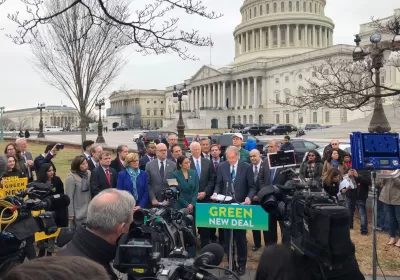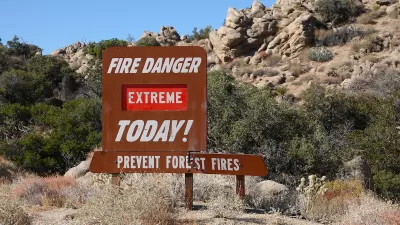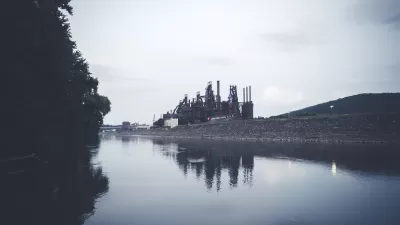Long before winning the congressional seat in California's 49th District, Mike Levin advocated for clean energy and a green economy.

Shortly after being elected to Congress, California Rep. Mike Levin endorsed the concept of a Green New Deal (later introduced as a resolution by Rep. Alexandria Ocasio-Cortez and Sen. Edward Markey). Then, he initiated the first Congressional hearings on climate change in nearly a decade.
Levin represents coastal communities in the counties of Orange and San Diego. In an exclusive interview with The Planning Report, he details his plans for bold climate action and the types of policies that will ground the broad Green New Deal framework.
The resolution "addresses the myth that a shift to a clean and renewable energy economy has to come at the expense of jobs," Levin tells TPR. "Quite the opposite: The Green New Deal and an accelerated transition to renewables will help us grow the clean energy jobs of the future and lift up the middle class."
In the interview, Levin—an energy wonk at heart—names his top strategies for getting California to 100 percent renewable energy by 2045:
- Upgrading the electrical grid to accommodate distributed energy generation
- Facilitating widespread adoption of electric vehicles
- Reducing the carbon footprint of building stock
He also describes his efforts to safely store radioactive waste from nuclear plants, particularly the decommissioned San Onofre plant on the California coast. And, he promises, "We House Democrats are absolutely committed to passing an infrastructure bill."
FULL STORY: California Rep. Mike Levin on the Green New Deal & Congressional Climate Action

Planetizen Federal Action Tracker
A weekly monitor of how Trump’s orders and actions are impacting planners and planning in America.

Map: Where Senate Republicans Want to Sell Your Public Lands
For public land advocates, the Senate Republicans’ proposal to sell millions of acres of public land in the West is “the biggest fight of their careers.”

Restaurant Patios Were a Pandemic Win — Why Were They so Hard to Keep?
Social distancing requirements and changes in travel patterns prompted cities to pilot new uses for street and sidewalk space. Then it got complicated.

Platform Pilsner: Vancouver Transit Agency Releases... a Beer?
TransLink will receive a portion of every sale of the four-pack.

Toronto Weighs Cheaper Transit, Parking Hikes for Major Events
Special event rates would take effect during large festivals, sports games and concerts to ‘discourage driving, manage congestion and free up space for transit.”

Berlin to Consider Car-Free Zone Larger Than Manhattan
The area bound by the 22-mile Ringbahn would still allow 12 uses of a private automobile per year per person, and several other exemptions.
Urban Design for Planners 1: Software Tools
This six-course series explores essential urban design concepts using open source software and equips planners with the tools they need to participate fully in the urban design process.
Planning for Universal Design
Learn the tools for implementing Universal Design in planning regulations.
Heyer Gruel & Associates PA
JM Goldson LLC
Custer County Colorado
City of Camden Redevelopment Agency
City of Astoria
Transportation Research & Education Center (TREC) at Portland State University
Camden Redevelopment Agency
City of Claremont
Municipality of Princeton (NJ)





























